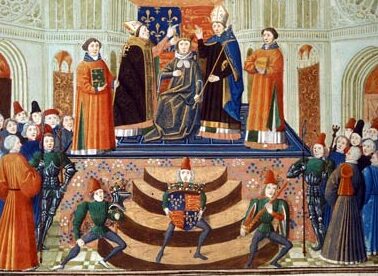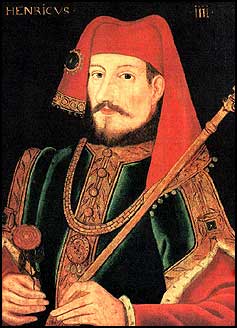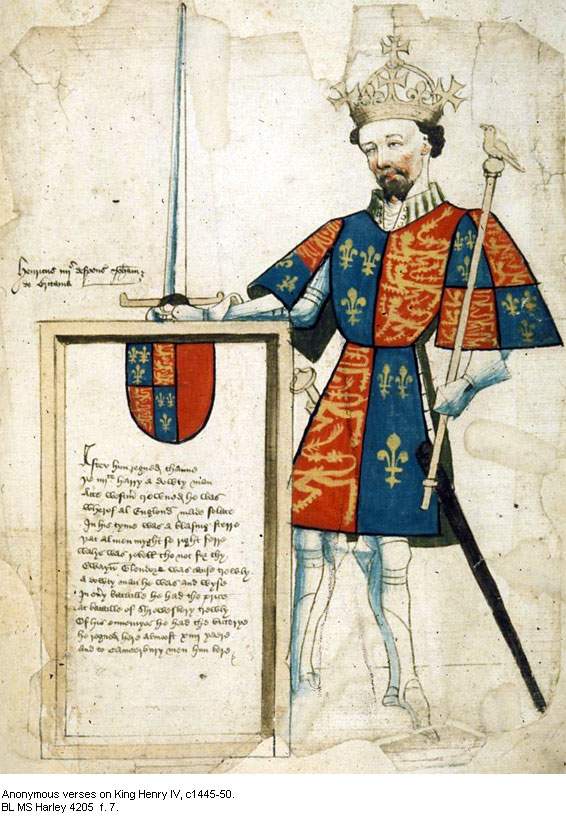“Medieval Superstition and Henry IV’s Illness”



The nature of medieval superstition will be considered in the third chapter. Henry IV was known to be extremely superstitious, though was also devoutly Catholic. This appears to be at odds. Also, Henry’s illness, so-called leprosy, will be investigated. This chapter will seek to uncover the relationship between religion and the occult, as well as, how the king’s illness was attributed to either. This portion of the thesis will build upon previous chapters, as Henry was guilt-ridden over usurping Richard’s throne, arranging his murder, and executing Richard le Scrope. It is likely the king’s intense contriteness, at least partially, contributed to his illness. This chapter begins with a brief overview of medieval occult practices and how contemporaries perceived them, before moving into specific situations and people.
Henry looked to omens to justify his actions, which likely influenced others into supporting him as well. The medieval world put great store in to premonitions and signs. Owain Glyndŵr was thought to be a wizard; Edmund Mortimer was said to have been born “at the very moment…the horses in his father’s stables were found standing up to their knees in blood;” the “Stella Comata” was thought to signify “evil auguries;” and at the Battle of Shrewsbury, Hotspur mentions a soothsayer’s words. Additionally, Henry’s second wife, Joanna of Navarre will be considered, as she was accused of causing her husband’s death through necromancy.
Magic, supernatural, superstition, wizardry – all words used to describe different elements of the same phenomena. Both the secular and ecclesiastical realms of medieval society were faced with the appeal, the problems, and the fear of magic. To make matters more complicated, there is not a solid definition of magic, as no single, all-encompassing word existed. The Middle Ages – as modern times – relied upon a mélange of words to convey nuanced connotations. What was certain was magic’s appeal reached from the lowest, poorest peasant to the highest, most educated noble. Henry IV – like many of his contemporaries – found it possible to be a devout Catholic and still hold the supernatural in high regard, believing in the veracity of both. The occult appealed to all walks of life: peasants to clergy to noblemen and even to the king. Medieval people looked to magic as a means by which they could control their lives, which meant the clergy and the Church had to tread carefully. As a result, this line between magic and religion “focused not on pagan worship[,] but on widespread ritual practices – the things many people did to gain health, prosperity, good fortune[,] and protection against evil.”
In a culture dependent upon God and fearful of omens, medieval Christians balanced the Church and the occult. Prayer was powerful, but when it failed to deliver the desired result, the pious would not place the blame on God, so it must have been the result of magic or dark forces. The concept of superstition dates back to the Roman period when Christian writers “declared that all pagan rites, insofar as they were directed toward Christian demons only masquerading as pagan deities, were improper, misinformed, and hence superstitious.” Throughout fifteenth century Europe, the clergy “increasingly reviled superstitions in everyday practices as the fearful portal allowing the devil’s entry into human affairs,” though the English clergy “never ignored beliefs and practices they termed ‘superstition.’”
Even Thomas Becket, Archbishop of Canterbury is said to had dappled in magic. John of Salisbury admonished Becket “for consulting diviners” about the outcome of King Henry’s invasion of North Wales in 1157.
As a result of his war with Reginald de Grey, Owain Glyndŵr stirred rebellion against the king, sending Henry’s forces to Wales. Here he faced violent storms and torrential rain, leaving the English to declare Glyndŵr a wizard—using the supernatural to explain their troubles as was the medieval way.
Shakespeare portrays Glyndŵr as a sorcerer:
Three times hath Henry Bolingbroke made head
Against my power; thrice from the banks of Wye
And sandy-bottomed Severn have I sent him
Bootless home, and weather-beaten back.
(Henry IV Part 1 3.1.1607-1610)
And in Hardyng’s account, each time the king was met with “mystes and tempests” and his “men trowed [y] witches it made that stounde.” Society was all too ready to accept magic to explain ill (or good) tidings. Therefore, the king’s camp had to spin any omens that might be unfavorable to his reign. If God was with the king – as He naturally was as far as they were concerned – the truth had to be that Owain was with the Devil and used dark magic to interfere.
CONTINUED…
